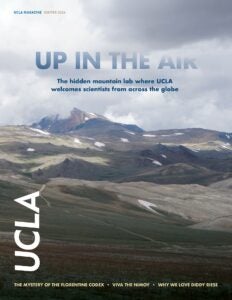I first heard of the legendary Charles Young M.A. ’57, Ph.D. ’60 — “Chuck,” as I would come to know him — when I was an undergraduate at Stanford in the late 1960s and he was new to his role as UCLA’s seventh chancellor. From his first days on the job, Chuck was outspoken, brimming with energy and laser-focused on elevating the contributions and stature of his campus. He maintained those qualities throughout a remarkable 29-year tenure at the helm of UCLA. (You can learn more about his life through the timeline in this issue of UCLA Magazine.)
Sadly, our community lost this prolific leader in October, when he passed away at the age of 91. Chuck’s passing has been felt keenly by his loved ones, as well as the students, faculty and staff who attended and worked at UCLA during his long tenure. His death was a great loss for me as well.
Though his reputation preceded him, I finally met Chuck soon after I arrived at UCLA in July 2007 — 10 years after he had stepped down as chancellor. We had lunch at the faculty center and discussed his career and many accomplishments. As we were wrapping up our meal, he told me, “You’ll find me to be a really good ex-chancellor. If you need advice, just call me. Otherwise I’ll stay out of your hair.”
He then looked out the window, turned back to me and said, “Gene, you really need to cut down that tree.”
That memory of our first meeting makes me laugh to this day because Chuck clearly loved UCLA so deeply that he simply could not disengage. Even as he took up new and different duties — for example, steering L.A.’s Museum of Contemporary Art out of financial trouble in the late 2000s, or serving as interim superintendent of the Sonoma Valley Unified School District in 2017, when the district encountered a leadership crisis — I came to expect Chuck to weigh in on the UCLA issues he had strong feelings about. Whether he wanted to discuss new research programs, student diversity, college athletics, community well-being or just campus landscaping, I would frequently take long calls with Chuck and have rich, spirited discussions — and, occasionally, passionate debates. But even when we disagreed, I would come away with a much deeper understanding of the issue and appreciation for a perspective honed by a lifetime of service to UCLA.
Many members of today’s Bruin community may only know Chuck’s name as that on the Young Research Library and the road that winds through much of UCLA’s campus. But whether or not you know much about the man or were acquainted with him personally, I am certain that you have felt his influence on our university. Perhaps more than any other individual, he is the person responsible for UCLA’s remarkable ascent over the course of the last half-century.
When he became chancellor in 1968, Chuck inherited a midsize commuter school with an operating budget of $170 million and one endowed professorship. At the time of his retirement in 1997, UCLA was a world-class research university that was a magnet for scholars and students across the globe, with a budget approaching $2 billion. He was an ardent advocate for first-rate research and teaching, a clarion voice for ethnic and cultural diversity, a devout believer in public service, a champion of inclusivity in athletics, a passionate spokesman for internationalism and a fierce defender of academic freedom — even when his principles put his job on the line.
Throughout his tenure, Chuck displayed tremendous fortitude. He strongly believed in institutional independence. Any time he thought there was overreach from the state government or UC Board of Regents, he held his ground. Chuck taught me that a leader must have the courage to stand by their convictions and do the best for the campus, even when a decision might be unpopular.
In his inaugural address to the Academic Senate in 1968, Chuck said that he hoped to take UCLA “from the second level of good universities to the first rank of excellent universities.” He accomplished this goal, beyond a doubt. In doing so, he vastly expanded access to a high-quality education in California, facilitated world-changing research achievements and did much to advance the common good. He will be greatly missed — by me and many others — but his legacy will surely live on.
Read more from UCLA Magazine’s Winter 2024 issue.

